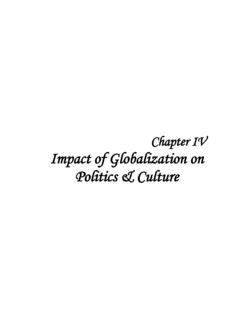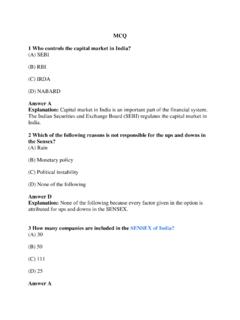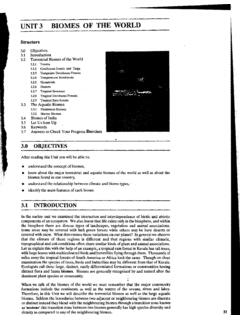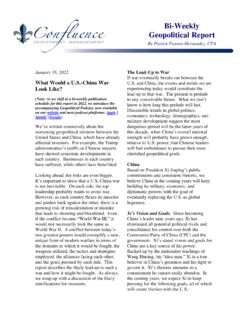Transcription of Globalization: A Critical Introduction, Second Edition
1 GlobalizationA Critical IntroductionJan Aart ScholteSecond Edition GLOBALIZATION Also by Jan Aart ScholteENCYCLOPEDIA OF GLOBALIZATION (co-editor,forthcoming)CIVIL SOCIETY AND GLOBAL DEMOCRACY (forthcoming)CIVIL SOCIETY AND GLOBAL FINANCE (editor)CIVIL SOCIETY VOICES AND THE INTERNATIONAL MONETARYFUNDCONTESTING GLOBAL GOVERNANCE: Multilateral EconomicInstitutions and Global Social Movements (co-author)INTERNATIONAL RELATIONS OF SOCIAL CHANGE GlobalizationA Critical IntroductionSecond EditionJan Aart Scholte Jan Aart Scholte 2000, 2005 All rights reserved. No reproduction, copy or transmission of this publication may be made without written paragraph of this publication may be reproduced, copied or transmitted save with written permission or in accordance with the provisions of the Copyright,Designs and Patents Act 1988, or under the terms of any licence permitting limitedcopying issued by the Copyright Licensing Agency, 90 Tottenham Court Road,London W1T person who does any unauthorized act in relation to this publication may be liable to criminal prosecution and civil claims for author has asserted his right to be identified as the author of this work in accordance with the Copyright, Designs and Patents Act Edition 2000 Second Edition 2005 Published byPALGRAVE MACMILLANH oundmills, Basingstoke, Hampshire RG21 6XS and175 Fifth Avenue, New York.
2 10010 Companies and representatives throughout the worldPALGRAVE MACMILLAN is the global academic imprint of the Palgrave Macmillan division of St. Martin s Press, LLC and of Palgrave Macmillan is a registered trademark in the United States, United Kingdom and other countries. Palgrave is a registered trademark in the European Union and other : 978 1 4039 0448 5 hardbackISBN 10: 1 4039 0448 0hardbackISBN-13: 978 0 333 97702 6 paperbackISBN 10: 0 333 97702 5paperbackThis book is printed on paper suitable for recycling and made from fully managed and sustained forest catalogue record for this book is available from the British catalog record for this book is available from the Library of Congress1098765432114131211100908070605 Printed in China Summary of ContentsList of BoxesxiPreface to the Second EditionxiiiPreface to the First EditionxviiAcknowledgementsxixList of AbbreviationsxxIntroduction1 PART IFRAMEWORK OF ANALYSIS1 Globalization Debates132 Defining Globalization493 Globalization in History854 Explaining Globalization121 PART IICHANGE AND CONTINUITY5 Globalization and Production: From Capitalism to Hypercapitalism1596 Globalization and Governance: From Statism to Polycentrism1857 Globalization and Identity.
3 From Nationalism to Hybridization2248 Globalization and Knowledge: From Rationalism to Reflexivity256 PART IIINORMATIVE AND policy ISSUES9 Globalization and (In)Security27910 Globalization and (In)Equality31611 Globalization and (Un)Democracy34812 (Re)constructing Future Globalizations382 Conclusion424 Bibliography426 Index477v This page intentionally left blank ContentsList of BoxesxiPreface to the Second EditionxiiiPreface to the First EditionxviiAcknowledgementsxixList of AbbreviationsxxIntroduction1 Framework of analysis2 Change and continuity4 Normative and policy issues6 PART IFRAMEWORK OF ANALYSIS1 Globalization Debates13 Main points of this chapter13 Where to start?15 Continuity or change?22 Liberation or shackles?29 What to do?37 Conclusion472 Defining Globalization49 Main points of this chapter49 Rise of the g-word50 Starting premises for definition52 Redundant concepts of globalization54A way forward59 Qualifications75 Conclusion843 Globalization in History85 Main points of this chapter85 Intimations of globality: to the nineteenth century87 Incipient globalization: to the mid-twentieth century91vii Contemporary accelerated globalization101 Conclusion1174 Explaining Globalization121 Main points of this chapter121 Contending theories123An eclectic synthesis135 Conclusion152 PART IICHANGE AND CONTINUITY5 Globalization and Production: From Capitalism to Hypercapitalism159 Main points of this chapter159 Expanded commodification161 Altered organization177 Conclusion1836 Globalization and Governance.
4 From Statism to Polycentrism185 Main points of this chapter185 The obsolescence of statism188 The reconstructed state192 Multi-scalar public governance202 Privatized governance214(Global) civil society218 Conclusion2217 Globalization and Identity: From Nationalism to Hybridization224 Main points of this chapter224 Globalization and the nationality principle227 Plural national identities231 Nonterritorial identities239 Hybridization252 Conclusion2548 Globalization and Knowledge: From Rationalism to Reflexivity256 Main points of this chapter256 Epistemology258 Ontology267viiiContents Methodology269 Aesthetics273 Conclusion274 PART IIINORMATIVE AND policy ISSUES9 Globalization and (In)Security279 Main points of this chapter279 Peace281 Crime284 Ecological integrity285 Health288 Poverty289 Financial stability294 Employment296 Working conditions300 Identity304 Knowledge306 Social cohesion308 Conclusion31110 Globalization and (In)Equality316 Main points of this chapter316 Class inequalities320 Country inequalities325 Gender inequalities334 Other inequalities340 Conclusion34411 Globalization and (Un)
5 Democracy348 Main points of this chapter348 The limits of statist liberal democracy351 Citizen ignorance355 Institutional process failures361 Structural inequalities371 Conclusion38012 (Re)constructing Future Globalizations382 Main points of this chapter382 General policy strategy383 Enhancing human security396 Contentsix Enhancing social equality404 Enhancing democracy410 Towards implementation417 Conclusion421 Conclusion424 Bibliography426 Index477xContents List of BoxesCore theses on globalization8 Globalization debates in summary47 Manifestations of globality in summary74 Summary chronology of incipient globalization, 1850s 1950s100 Summary indicators of accelerated globalization in contemporary history117 Contending social explanations of globalization135 Principal dynamics of globalization153 Implications of globalization for production in summary184 Implications of globalization for governance in summary222 Implications of globalization for identity in summary254 Implications of globalization for knowledge in summary274 Globalization and (in)security in summary312 Globalization and (in)equality in summary345 Globalization and (un)democracy in summary380 Towards more humane globalization422xi This page intentionally left blank Preface to the Second EditionBooks on globalization date quickly in the early twenty-first century.
6 It is onlyfive years since the publication of the first Edition , but rapid developments inthe practice and research of globalization, as well as in my own thoughts andexperiences of globality, have already necessitated a large-scale terms of concrete actions and trends, the first Edition was completedonly a few months after the anti-WTO protests in Seattle and before thesubsequent upsurge of high-profile resistance against prevailing policyapproaches to globalization. It was written before the striking militarizationof globalization fuelled by the attacks of 9/11, wars in Afghanistan and iraq ,heightened disputes over nuclear proliferation, and intensified state surveil-lance of citizens. Moreover, it predated the Bush Administration s retreatfrom multilateralism, the introduction of the euro, and the WTO impasse atCanc n.
7 The intervening years have in addition brought further so-called Post-Washington Consensus reforms of policies towards economic global-ization. Hence the book has required considerable updating to catch up withcurrent course it is easy to overestimate the significance of the short-term beatof history. The immediacy of recent occurrences, crammed into ourconsciousness by 24/7 media saturation, can easily distract us from deeper,more pervasive, and more persistent features of social is largely a matter of what the historian Fernand Braudel calledthelongue dur e, the extended time frame of generations and centuries wherethe principal features and forces of societal development tend to reside(Braudel, 1958). Hence, although events of five years may put some aspectsof globalization into sharper relief or a different light, it is unlikely that coreattributes of the process would change in such a short period.
8 Surface appear-ances of globality like the SARS health scare of 2003 come and go; the deepertrend of growing transplanetary social connectedness still matters very much in 2005. Yes, certain calculations ofa few types of global movements have of late shown a year-on-year decelera-tion. For example, foreign exchange turnover declined between 1998 and2001 owing to developments such as the introduction of the euro, althoughthese transactions had increased substantially again by 2004. The rate offoreign direct investment (FDI) inflows slowed for three years in 2001 3,although FDI too has since rebounded. In fact, almost all empirical indicatorsof globality have persisted and often risen further in significance since life continues to be increasingly suffused with issues of global health,xiii global ecology, global travel, global communications, global military activi-ties, global production processes, global markets, global meanings, globalregulations, and global social movements.
9 In the light of this continued signif-icance it is hardly surprising that the number of references to globalization in the Library of Congress catalogue has multiplied more than sevenfold inthe five years since the first Edition (LoC, 1999, 2005).Thus several recent proclamations of a purported end of globalization areunsustainable (Gray, 2001; James, 2001; Rugman, 2001; Ralston Saul,2004; Rosenberg, 2005). To be sure, many exuberant claims of an earliergeneration of writings (including some by the present author) about thescale, scope, intensity and impact of globalization need to be qualified orabandoned. For example, the growth of transplanetary connections betweenpeople is clearly not prompting the end of geography, the demise of the state,the disappearance of the nation, or the dissolution of modernity. However,a scaling down of previous exaggerations about globality should not beconfused with a decline in actual globality.
10 Obituaries for globalization arehighly , the better literature on globalization has become progressivelymore sophisticated over the 20 years since the concept entered academiccirculation. Such writings offer tighter conceptualization, more evidence, andgreater nuance. Nevertheless, significant challenges remain for futureresearch on globalization. For one thing, global (as distinct from interna-tional) data continue to be in short supply. Most statistics are still calculatedin relation to state-country units. In addition, little tightly consolidated andsystematically elaborated theorization of globalization is available. The liter-ature to date has been much richer in description and prescription than inexplanation. Meanwhile, interdisciplinarity generally remains more aspira-tion than actuality in globalization studies.







